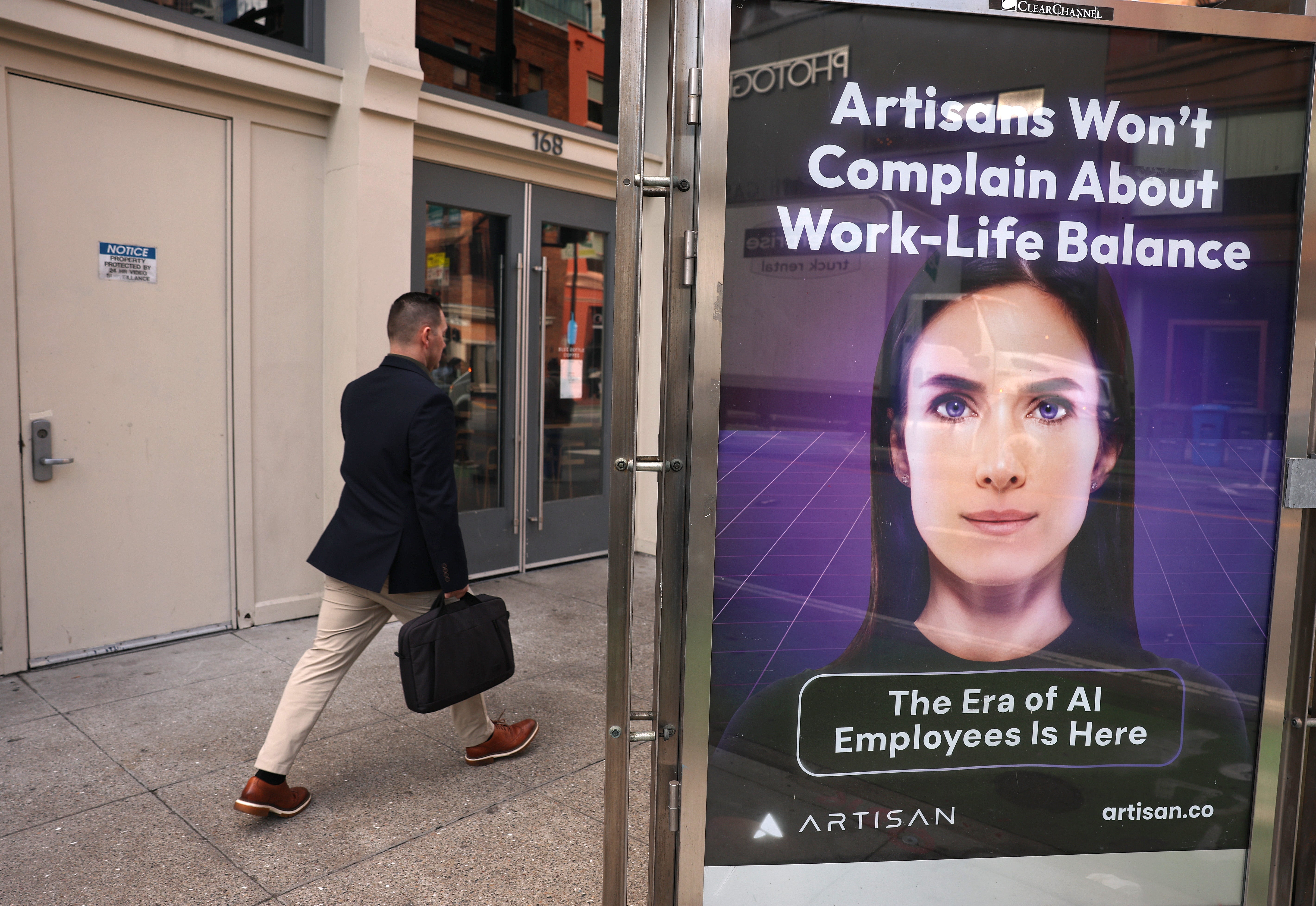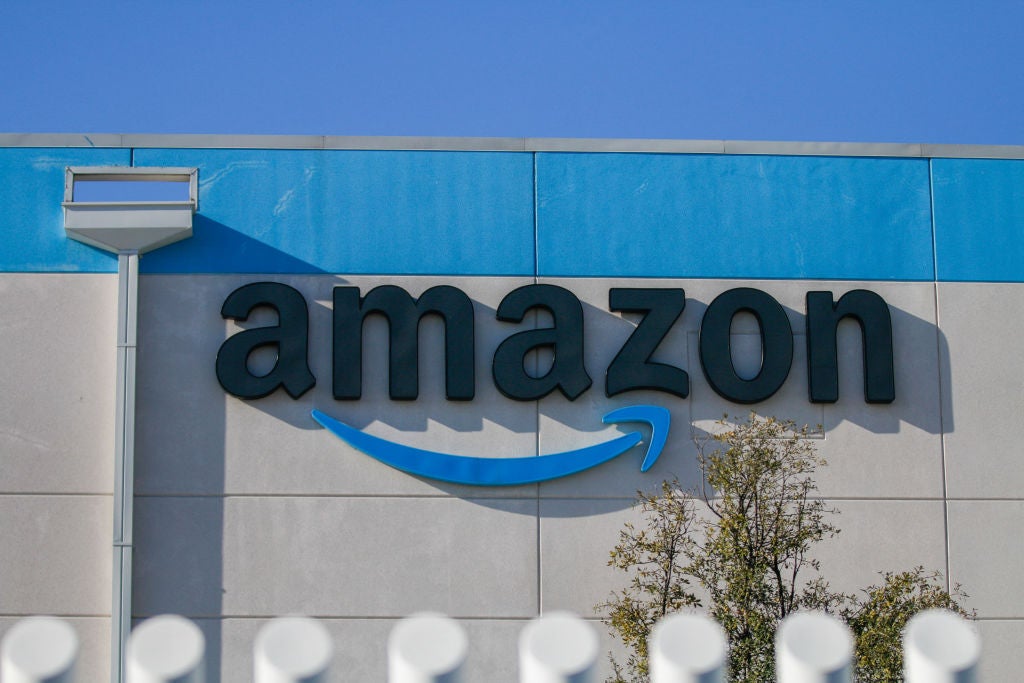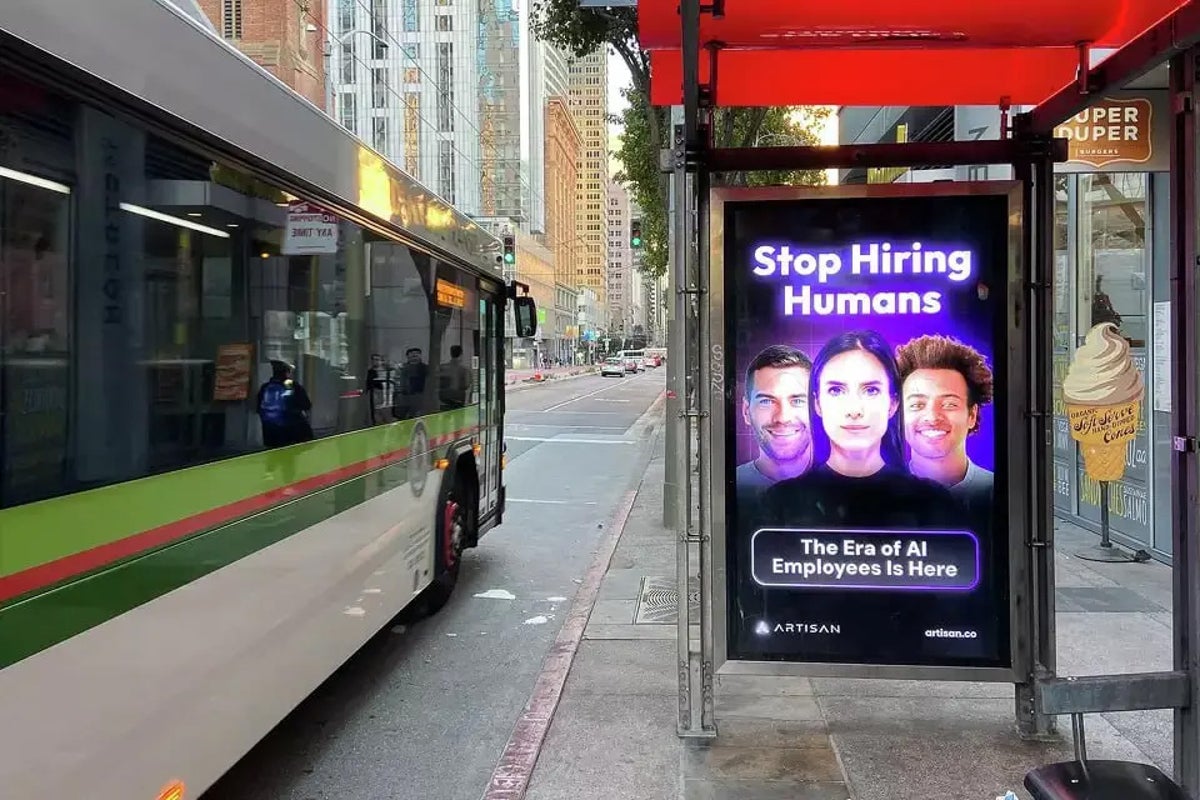At a recent panel discussion of business leaders, there was a momentary stunned silence when the CEO of a software company said that he hoped the cost of employing humans would become increasingly prohibitive, thanks to tax and regulatory changes, so that more bosses would turn to tech.
We’d just been discussing AI and the likelihood of jobs disappearing, and the societal and cultural problems this would cause. We’d all agreed that the implications were immense and deeply troubling. Well, I thought we had. Until the software guy said he was relishing the prospect of people being shoved on the scrapheap. He made his money from selling machine systems, and the more they sold, the better his company did. Simple. As he said, it would be hypocritical of him to pretend otherwise.

open image in gallery
Artisan’s Jaspar Carmichael-Jack claimed the poster campaign was ‘rage bait’ designed to get people’s attention (Getty)
At least he was being honest. Plenty of others in tech and AI are afraid to speak the truth, choosing to hide behind blandishments like “uncertain”, “too early to tell”, “we just don’t know”, “someone must operate the AI”, “we will be freed up to be more creative”, “roles we aren’t even aware of yet will make up for those that are lost”, and so forth.
Occasionally, one will break cover and say what they are really thinking. This week, it was the turn of Artisan, an AI agency in San Francisco. They ran another poster campaign exhorting people to “stop hiring humans” and asserting that “the era of AI employees is here”. The company’s head, Jaspar Carmichael-Jack, claimed afterwards that the campaign was “rage bait”, designed to get people’s attention, and did not reflect an ambition to torch all human workers.

open image in gallery
US politician Bernie Sanders pointed out that if we are going to be replaced by robots, who is going to buy all the products that capitalism relies on selling to us? (Getty)
It certainly hit a nerve. The slogans went viral, and opprobrium duly rained down. The US politician Bernie Sanders made a good point when he said, if we are going to be replaced by robots, who the hell is going to buy all the products that capitalism relies on selling to us? If the jobs market collapses, does capitalism?
Nice try, Bernie. If capitalism is about to die, the tech bros and their monied pals are not bothered. They are continuing to pour billions into developing AI, regardless. In the last quarter alone, an estimated $80bn (£61bn) has been invested in advancing AI.
It bears repetition: $80bn in three months. For no discernible payback. Not yet. It’s a bubble; of course it is. At any moment, this crazy headlong rush will crash, and then mayhem and global economic depression will ensue. But wait. These are not stupid people. They are making a bet, and their calculation has to be that human capital is to be substituted by something far cheaper and more efficient, and then the rewards will truly flow and those returns will dwarf anything they have put in.
Ultimately, it is where they hope to be: like the software exec, only supersized. They realise wrath will descend. But that does not stop them from wishing it to happen. They will be alright, Jack, because they will own the algorithms and the hardwired applications. As for the rest of us…

open image in gallery
Amazon are cutting 14,000 posts (AFP/Getty)
For now, we’re invited to relax. It’s too soon; we’ve no idea what is coming. There has been some encouragement. Research from Yale and the Brookings Institution suggests that jobs will not vanish overnight, reminding us that it took computers years to take hold. But the study doesn’t say that they won’t disappear; just that it might be a while before AI’s full impact is felt.
Hints of the impact coming our way are the heavy lay-offs that are already occurring and are mounting by the day. The latest employer to announce a cull is Amazon, where 14,000 posts are going. Amazon joins other companies who have already declared redundancies. At the same time, a freeze is underway. As with the departures, AI is widely held responsible. It is quite likely that this is not the whole story, but the AI umbrella is a convenient catch-all.

open image in gallery
Elon Musk has repeatedly stated that AI and robotics pose a significant threat to jobs (AP)
What is surely more significant is that Amazon will still employ 1.6 million people, and the number being culled is a mere blip when set against that figure. But how many of those roles will still exist when AI does seriously kick in? And before you say there will be room for van drivers, why do you suppose the tech bros are so excited about putting cash behind driverless vehicles?
Leading the charge is Elon Musk. He has repeatedly stated that AI and robotics pose a significant threat to jobs, predicting that automation will eventually make all human labour optional. He envisages a future where humans will be free from the chore of work. Quite how they are going to pay for food, and heat, and clothes, and homes, and the other necessities of existence, remains to be seen.

open image in gallery
Does Keir Starmer understand the perils of ‘sleepwalking’ into an AI disaster? (PA)
He does say, though, that it will be disruptive, so that’s OK. Sleepwalking into this unfolding disaster are the politicians, those we look to in the hope that they will help us and guide us (don’t laugh). Sanders, for one, understands, and is not afraid to say so. But do Donald Trump, Keir Starmer and Emmanuel Macron – all of whom have held AI investment summits and trumpet vast dollops of financial commitment to advance AI in their countries, regardless of what it could mean in the long term?
Fear, anxiety and unrest are building. Nothing is being done to slow the pace of this new revolution. Perish the thought, but I’m almost hoping that the bubble does explode, and the great AI revolution is halted or slowed. Yes, it would cause pain, but larger-scale suffering may be avoided or postponed. I never thought I would write that, but someone, please, show me the alternative.
